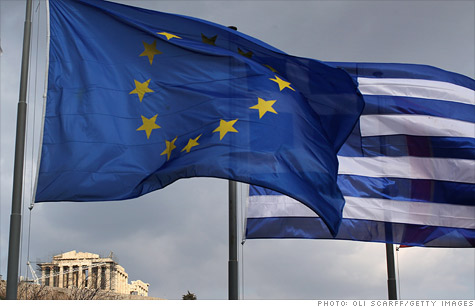Search News

Many things need to go right to successfully work through the Greek mess without knocking the eurozone economy over.
Douglas J. Elliott is a fellow in economic studies at the Brookings Institution, where he specializes in analyzing the global financial system and its regulation.
The rest of the eurozone was really hoping that Greece would stay out of the spotlight for at least a few more months, and ideally longer.
Eurozone leaders recognize the great difficulties in solving Greece's terrible problems, worsened by serious deficiencies in Greek administrative capabilities and even worse problems with its political culture.
To their credit, they have been willing to provide large amounts of financial and administrative assistance to help things along. But they have also been fervently hoping to buy time for the rest of the eurozone to become stable enough to handle the problems that could arise if Greece explodes.
For this reason, they were strongly rooting for the traditional mainstream parties to win a majority in parliament, since those parties have each promised to honor their previous commitments to European and global institutions.
But, that did not happen. The two parties that traditionally dominated Greek politics fell just short of a majority, despite a 50-seat bonus that went to one of them for winning the largest number of popular votes.
Parties that oppose the international agreements won about 70% of the popular vote, as the public revolted against the political elites that got Greece into such a mess and the Germans and other Europeans who are seen as having imposed excessive pain. One cannot blame the anger: Greece is now in its fifth year of recession and the damage is very severe.
There are so many uncertainties surrounding Greece that satellite photos probably show a giant question mark where the peninsula used to be. The one thing that seems fairly clear is that another election will have to be held shortly, since there does not appear to be any combination of the parties that can command a stable majority.
There is a real chance that the leftist party that came in second this time will come in first next time, gaining that critical 50-seat bonus, and perhaps creating a solid majority with other parties that share its rejection of the international agreements.
Greece is a small country which does not directly affect America much, even though our hearts go out to the Greeks in their struggles. The real issue for us is whether Greek contagion will again infect the rest of the eurozone and, this time, produce a catastrophe.
I continue to believe that Europe will muddle through, avoiding the worst outcomes, which would be national debt defaults beyond Greece or withdrawals from the Euro. If they succeed in that modest goal, they will likely avoid the kind of sharp recession that would trigger a recession here as well.
The eurozone as a whole has the economic strength to get through its problems, since it has an economy roughly the same size as the United States, with significantly lower annual budget deficits, and accumulated debt modestly below ours. As with the United States, the real issues are about political will and the ability to forge the necessary consensus.
My continued cautious optimism is based on the strong desire of all key European leaders to avoid a recession severe enough to get them fired, combined with long commitments by those leaders to the "European Project," the kind of commitments that carry major political costs when they are broken.
In other words, the economics make a compelling case for sticking together, and the broader political structure pushes the leaders in the same direction, despite less Euro-enthusiasm among the public in some countries.
The risk, though, is that many things need to go right to work through the Greek mess without knocking the eurozone economy over and to avoid the problems that lurk in many other eurozone countries. Will Greece pull back from the brink of a confrontation with its key financial supporters?
Will the European leaders find yet another clever way to finesse their differences with Greece and with each other? Are the financial "firewalls" built up by the Europeans sufficient to reassure the markets if the Greek situation falls apart?
Will the European Central Bank and national governments step in with the necessary massive financial commitments if worse comes to worst? The list of questions goes on, especially once we look outside of Greece to other potential trouble spots.
Don't count Europe out; they have been proving doubters wrong for several decades and my money is on them to do it again. But don't bet too heavily on success either, there are simply too many risks. Cautious optimism should be the watchwords. ![]()
| Index | Last | Change | % Change |
|---|---|---|---|
| Dow | 32,627.97 | -234.33 | -0.71% |
| Nasdaq | 13,215.24 | 99.07 | 0.76% |
| S&P 500 | 3,913.10 | -2.36 | -0.06% |
| Treasuries | 1.73 | 0.00 | 0.12% |
| Company | Price | Change | % Change |
|---|---|---|---|
| Ford Motor Co | 8.29 | 0.05 | 0.61% |
| Advanced Micro Devic... | 54.59 | 0.70 | 1.30% |
| Cisco Systems Inc | 47.49 | -2.44 | -4.89% |
| General Electric Co | 13.00 | -0.16 | -1.22% |
| Kraft Heinz Co | 27.84 | -2.20 | -7.32% |
| Overnight Avg Rate | Latest | Change | Last Week |
|---|---|---|---|
| 30 yr fixed | 3.80% | 3.88% | |
| 15 yr fixed | 3.20% | 3.23% | |
| 5/1 ARM | 3.84% | 3.88% | |
| 30 yr refi | 3.82% | 3.93% | |
| 15 yr refi | 3.20% | 3.23% |
Today's featured rates: